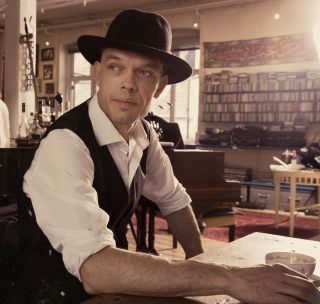Interviews

- Details
- Written by: Giovanni "Gio" Pilato
2017 is almost over and it was certainly another very satisfying year for music in general. In the blues and rock scene, in particular, there have been several records shining and impressing both fans and worldwide press, thanks to a perfect blend of originality, great production, outstanding quality of musical and vocal arrangements, the lot.
One of the artists that has left a strong mark in 2017 is, undoubtedly, Danish blues and rock King Midas Thorbjorn Risager and his collective The Black Tornado. Their current album, called Change My Game and released early this year, is the ultimate statement of an artist and a band at the top of their game. An album packed with great songs, first class arrangements and some of Risager's best vocal performances ever recorded by the Danish artist in his career, Change My Game reflects as well, through its sound and the vibes emerging from the record, the atmospheres and the colors typical of the Scandinavian Region, adding a cinematic effect to the musical dynamic of the whole album, a bit like watching a Nordic Noir movie.
Read more: Nordic Noir - In Conversation With Thorbjorn Risager

- Details
- Written by: Giovanni "Gio" Pilato
Sometimes you cannot just help fate. Despite starting playing guitar at the age of 18, something that few would consider a relatively late stage in a musician's career, Texan folk/country singer/songwriter Jarrod Dickenson found himself in the space of few years and thanks to his many musical talents, to open up tours for artists of incredible stature like The Waterboys, Don McLean or Bonnie Raitt, just to mention few of them.
His 2012 album The Lonesome Traveler was a real triumph in many ways. Highly appreciated by both music critics and fellow artists too, The Lonesome Traveler gave Dickenson massive exposure, allowing him also to take part to some of the greatest music festival worldwide and, consequently, to be known by a wider audience through the years.
Read more: Under A Texan Moon - In Conversation With Jarrod Dickenson

- Details
- Written by: Giovanni "Gio" Pilato
(Photo by Leif Laaksonen)
It's rather difficult to find the right way to describe in one word the artistry of somebody like the 70 years-old rock pioneer Wilko Johnson, whose personal life and music career are of such stature that even the expressions "legendary" or "miraculous" struggle to express in its entirety.
Every respectable music fan knows of Johnson as being the former member, with Lee Brilleaux, of the mid-70's seminal rock band Dr. Feelgood or about the artist from Canvey Island joining Ian Dury's band, The Blockheads, later in 1980. In a career-span of almost 50 years made of many highs and very rare lows, Johnson has then reached in 2014 the top spot of the worldwide charts with the album Going Back Home, a record he made together with The Who's front-man Roger Daltrey, in a time of his life when Johnson, diagnosed with a terminal cancer, was mentally prepared to the idea of dying.
Read more: It's All An Accident! - An Interview With Wilko Johnson

- Details
- Written by: Giovanni "Gio" Pilato
(Photo by Tina Korhonen)
"The kids have gone to bed, so we can have a nice, quiet chat". It has not been very long since Bluebird Reviews last talked to an old time friend of our website, the very talented singer/songwriter and slide guitar goddess Erja Lyytinen. Even through a video call, it immediately transpires that the Finnish artist is in great form, through her contagious positivity and happiness and one of the nicest smiles of the music business. Just few months ago, Lyytinen's brand new album Stolen Hearts has received numerous accolades from fans and media and the album is still going very strong, in terms of record selling.
The Finnish artist had not released a new studio album since the 2013's one Forbidden Fruit and the sole release, in-between Stolen Hearts and Forbidden Fruit, has been the splendid 2015 live album recorded in England at the historic London venue The 100 Club.
Read more: Parenthood, Heartaches And Other Stories - In Conversation With Erja Lyytinen

- Details
- Written by: Giovanni "Gio" Pilato
When in April 2016 the British collective Broken Witt Rebels released their third EP called Georgia Pine, they created a huge buzz in the whole of the Indie music industry in Great Britain. The EP contained five songs of an incredible impact, either emotional, musical, lyrical, something that blew the minds of many music lovers, no matter the genre played.
Given the young overall age of the band members, gravitating in the early twenties, the explosive sound and the musical maturity expressed by Danny Core (Lead Vocals, Guitar), Luke Davis (Vocals, Bass Guitar), James Dudley (Drums) and James Tranter (Vocals, Lead Guitar) was one of the most pleasant surprises of 2016. The success of the Birmingham-based collective has continued through this year as well and still going, through a massive amount of Tour Dates that took Broken Witt Rebels all around the United Kingdom, receiving numerous accolades by the fans and the music press.
Read more: Happiness Is A Warm Gun - In Conversation With Broken Witt Rebels

